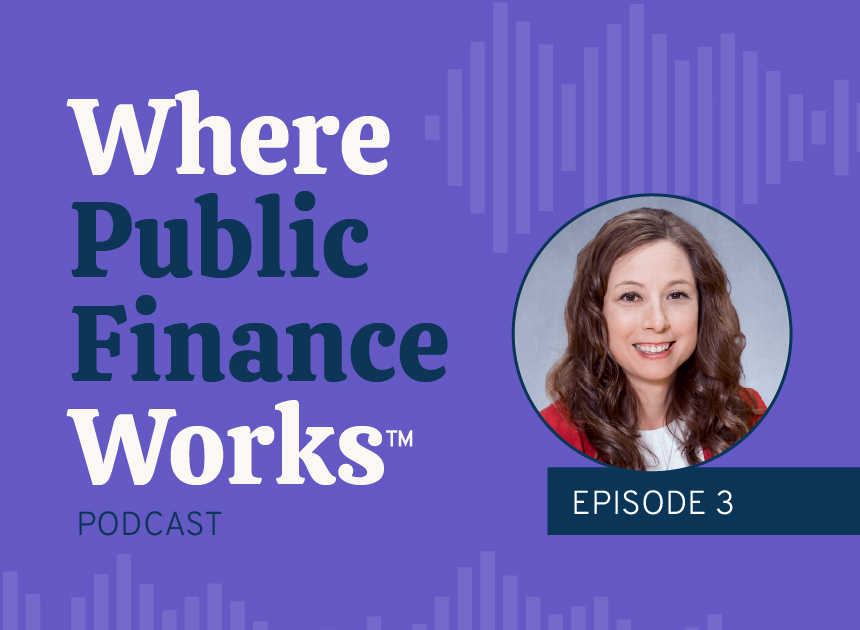Episode Summary
In this episode of Where Public Finance Works, we dive into the many challenges of local government finance with Lindsay Miller, the Finance Director of Junction City, Kansas. With a passion for numbers that propelled her to the active public service industry, Lindsay shares her trajectory of growth through the ranks, culminating in her current role where she's reshaping the fiscal landscape of Junction City.
Join our host, Tyler Traudt, as he uncovers the strategic challenges and triumphs of managing a city's finances amidst the ebbs and flows of military population changes. Discover how Junction City dealt with the repercussions of a stalled troop movement that left the city with a $133 million debt load.
Lindsay's insights into the nuances of local government finance, from the intricacies of staffing to the foresight in crisis management, are as educational as they are inspiring. This episode is not just a journey through the ledgers and spreadsheets of city finance but a narrative of resilience, community, and the relentless pursuit of progress.
Featured Guest
Lindsay Miller serves as the Finance Director for Junction City, Kansas. She began her career in finance at Kansas State University, where her academic journey in Business Administration and Management led to roles overseeing finances and human resources within the Mathematics Department. Progressing through various financial positions, Lindsay honed her expertise in financial analysis and audits before advancing to manage both accounting and human resources at the university’s Central Shared Service Center.
Taking on the role of Finance Director in 2018, Lindsay now spearheads the development and execution of Junction City's financial strategies, oversees the crafting of the annual budget, and institutes robust internal controls to safeguard funds.
Her diligent management encompasses the city's entire spectrum of revenues and expenses, ensuring the provision of precise and prompt financial reporting to key city officials.
Top Takeaways From Episode Three
- Navigating financial flux with strategic innovation: Lindsay Miller's narrative showcases the adaptability required in public finance. From managing university department budgets to directing Junction City's finances, her insights underscore the importance of innovative strategies to foster financial health, particularly in response to fluctuating military populations and the resulting infrastructure demands.
- Fortifying community resilience through proactive financial management: The episode highlights how Junction City's proactive measures, such as the implementation of a 1% sales tax, significantly reduced a once-daunting debt load. This tactical financial foresight not only addresses immediate needs but also safeguards against future economic uncertainties, ensuring the city's sustained growth and stability.
- Embracing prioritization maximizes efficiency: Lindsay’s approach to creating a prioritized 'wish list' for the city's expenditures demonstrates a keen prioritization of resources. These strategies emphasize the need to invest in one-time expenditures that yield long-term benefits and showcase how targeted financial management can lead to impactful community enhancements without incurring ongoing costs.
Public Finance Insights
[1:10] A love for business and numbers leads to a position in the Mathematics Department at Kansas State University: During her studies for a business degree at Kansas State, Lindsay is employed in the Mathematics Department, managing finances and overseeing grant allocations. Following a move to the Physics Department, she secured a role as a Shared Services Business Manager, assuming responsibility for the human resources and financial operations of various departments.
[4:30] Ready for a challenge, Lindsay becomes a Finance Director for Junction City: In her new capacity, Lindsay reports directly to the City Manager, embracing a broader scope of responsibilities across various functions and the financial sector than at any previous point in her career.
[6:12] Lindsay gives a background on Junction City and its significance in being a highly transient town: Situated on the interstate, Junction City boasts a population of approximately 25,000 residents. Its proximity to Fort Riley serves as a significant economic catalyst for the community.
[7:20] The city feels pressure to accommodate an influx of new troops to Fort Riley: Lindsay reflects on the city's ambitious infrastructure initiative that began almost two decades before her time at Junction City. Designed to accommodate incoming troops, this economic plan included the development of new housing, the installation of water lines, and the improvement of roads and sidewalks, anticipating benefits such as increased population, enhanced tax revenue, and bolstered sales.
[9:55] The 2008 financial crisis hits bringing the Fort Riley expansion plans to a halt: When the new soldiers are no longer moved to Fort Riley, the city faces the challenge of managing the debt from the funds borrowed and the partially completed infrastructure projects. This situation results in the city bearing millions of dollars in debt and contending with numerous vacant lots that currently have no practical use.
[13:08] The city has no choice but to take out a special 1% sales tax in the community: Lindsay explains the state statute that caps municipal debt and discusses the exceptional approvals Junction City sought to exceed these financial boundaries.
[15:45] $133 million in debt is brought down to $53 million: The city engages a third-party financial consultancy to conduct a comprehensive review. It’s this firm that recommends implementing sales tax to generate the needed additional revenue.
[16:46] Other city services suffer due to the outstanding debt: The city reaches a stage where it’s beginning to address the much-needed repairs of its water lines, a task that was previously unfeasible as funds were limited to essential expenditures. According to Lindsay, there was a time when debt repayments consumed over half of the city's budget.
[20:40] A ‘wish list’ is created to prioritize projects: Lindsay sheds light on the city’s 'wish list' and how she strategically prioritizes it by focusing on one-time expenditures. These are costs that, once paid, will not require ongoing financial commitments.
[22:10] Lindsay shares what she feels would be most impactful for the community: Should funds permit, Lindsay discusses how investing in projects that enhance the quality of life is advantageous for the community. Desirable facilities include an indoor swimming pool and a recreation center.
[25:54] Staffing issues lead to creative ways to draw in more people: Like many organizations, Lindsay’s local government finance team is grappling with recruitment challenges and must strategically prioritize which vacancies to fill first, focusing on the most critical roles. She also discusses the need to leverage technology to bridge the gaps and maintain operational efficiency.
[32:45] Lindsay talks about the future of Junction City: While welcoming a new interchange from the Kansas Department of Transportation, Junction City will persist in its commitment to debt reduction. The new interchange is a controversial topic within the community.. Lindsay notes that there’s cautious optimism about the interchange's potential as a revenue source, but historical concerns cause hesitation among many residents who are scarred from the Ft. Riley debt crisis that crippled the city’s budgets.
[39:23] The importance of building a cash reserve: Lindsay gives an example of a costly incident in December 2021, when a windstorm caused a citywide power outage and led to substantial damage at the water treatment plant, requiring expensive repairs and emergency measures to provide water to citizens.







